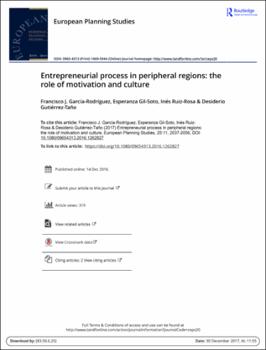García-Rodríguez, F. J., Gil-Soto, E., Ruiz-Rosa, I., & Gutiérrez-Taño, D. (2017). Entrepreneurial process in peripheral regions: the role of motivation and culture. European Planning Studies, 25(11), 2037-2056
Fecha
2017Resumen
The entrepreneurial potential of a region is a key factor in linking
innovation to the market, thus leading to economic growth. This is
especially important in peripheral regions that are characterized by
low innovative dynamism. This paper analyses the entrepreneurial
process in a European peripheral region, the Canary Islands, Spain.
It attempts to determine possible cultural specificities and the role
of motivation in the entrepreneurial process. To do this, an analysis
of entrepreneurial intention (EI) is framed within the theory of
planned behaviour and using motivation, opportunity and ability
theory. An empirical study was carried out using a sample of 1457
university students participating in the Global University
Entrepreneurial Spirit Students’ Survey project. Results indicate that
motivation influences EI directly and indirectly through an
individual’s attitude towards entrepreneurial behaviour. The
perception of business opportunities is also a significant antecedent
of entrepreneurial motivation. Consequently, entrepreneurial
education and policies to foster entrepreneurship in peripheral
regions should not attempt to transform individuals’ attitudes
towards entrepreneurship directly, but rather focus on improving
motivation using intensive pedagogical strategies in creativity that
go beyond mere informative content. Methodologies and content
focused on recognizing opportunities and problem-solving would
also be effective elements in educational programmes of
entrepreneurship.






